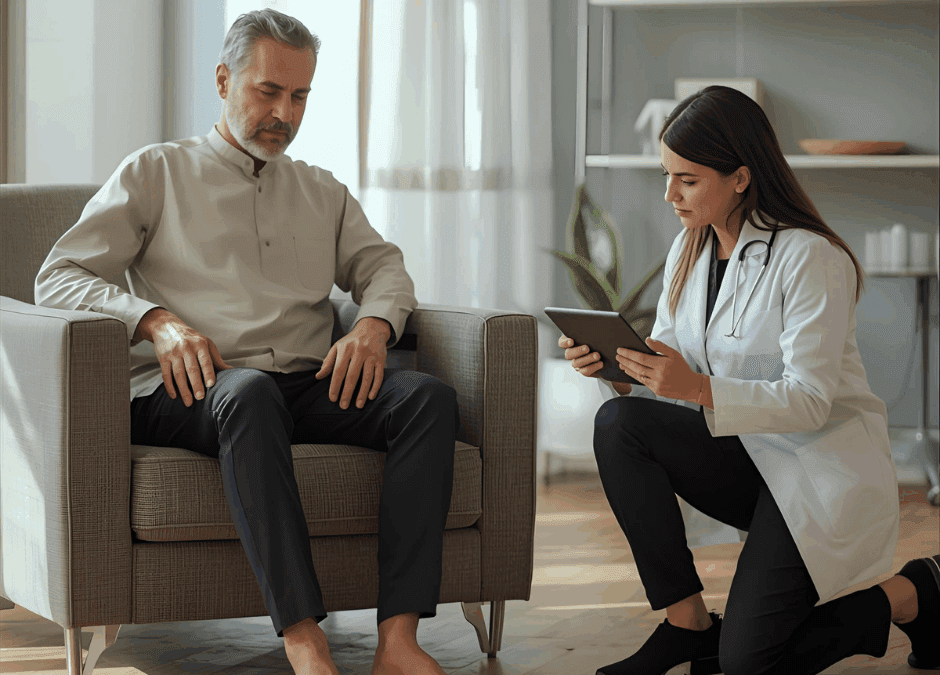
Understanding Peripheral Neuropathy
Medical Review: Dr. Gerald Mastaw, MD – Board-Certified Physician
Last Updated: October 2025
What Is Peripheral Neuropathy?
Peripheral neuropathy occurs when the peripheral nerves, the network that carries signals between your brain, spinal cord, and the rest of your body, become damaged or dysfunctional.
These nerves control sensation, movement, and involuntary functions such as blood pressure, digestion, and heart rate.
When they’re injured, communication between the brain and the body becomes disrupted, leading to symptoms such as:
- Numbness or tingling in the hands or feet
- Burning or stabbing pain
- Muscle weakness or loss of coordination
- Heightened sensitivity to touch
- Balance problems or difficulty walking
Common Causes
While diabetes is the most frequent cause, peripheral neuropathy can also result from:
- Physical injury or trauma
- Autoimmune disorders (like lupus or Guillain-Barré)
- Infections such as shingles or Lyme disease
- Vitamin deficiencies (especially B vitamins)
- Certain medications (including chemotherapy drugs)
- Exposure to toxins or heavy metals
Traditional Treatment Approaches
Conventional therapies primarily manage symptoms rather than repairing nerve damage.
While they can provide meaningful relief, many patients continue to experience chronic discomfort or numbness.
Common Treatment Options Include:
- Medications: Anti-seizure drugs or antidepressants used to reduce nerve pain
- Topical creams and patches: Such as capsaicin or lidocaine for localized pain
- Physical therapy: To improve strength, flexibility, and coordination
- Blood sugar management: Essential for diabetic patients
- Surgery: In select cases where nerve compression is the cause
These methods can ease discomfort but generally do not address the root cause, the loss or dysfunction of nerve cells.
Regenerative Medicine: A New Approach to Nerve Repair
Regenerative medicine represents a different strategy: it seeks to restore and protect nerve health by activating the body’s own healing potential.
Among the most studied options are umbilical cord tissue-derived mesenchymal stem cells (UCT-MSCs), young, dynamic cells capable of releasing natural growth factors that encourage nerve regeneration and reduce inflammation.
How UCT-MSC Therapy May Help
- Promote regeneration of damaged or degenerated nerve fibers
- Calm inflammation around affected nerves
- Enhance circulation and oxygen delivery to nerve tissue
- Reduce pain, tingling, and numbness over time
Unlike standard medications, these biologic therapies aim to support underlying repair processes, helping patients experience improved sensation, balance, and mobility as part of a long-term wellness strategy.
Recent Clinical Studies on Regenerative Medicine for Peripheral Neuropathy
2024 – Meta-Analysis of Stem Cell Therapy for Diabetic Neuropathy
Title: Human Studies of the Efficacy and Safety of Stem Cells in the Treatment of Diabetic Peripheral Neuropathy: Systematic Review and Meta-Analysis
Journal: Frontiers in Endocrinology – Full Text
Summary:
This 2024 meta-analysis reviewed multiple human clinical trials using umbilical cord-derived and other MSC-based therapies for diabetic neuropathy.
Results showed that treated patients had significantly faster nerve conduction, better sensory scores, and lower neuropathy severity compared to controls.
Adverse events were minimal—mostly mild, short-term injection-site discomfort.
The analysis concluded that MSC therapy may effectively promote nerve repair and symptom improvement with a strong safety profile.
2024 – Combination Therapy Reduces Neuropathy Risk Long-Term
Title: Bone Marrow and Umbilical Cord MSC Combination Therapy in Type 2 Diabetes: 8-Year Follow-Up
Journal: Stem Cell Research & Therapy – Full Text
Summary:
In this long-term randomized study, diabetic patients who received regenerative cell therapy—including UCT-MSCs—had a dramatically lower risk of developing peripheral neuropathy.
After 8 years, only 10% of treated patients developed neuropathy compared to 48% in the control group.
The authors concluded that stem cell therapy may offer protective effects for nerve health, helping prevent or delay neuropathy in diabetes.
2022 – Dual IV and Topical UCT-MSC Therapy for Diabetic Foot Ulcers
Title: Topical and Intravenous Administration of UC-MSCs in Diabetic Foot Ulcer and Peripheral Arterial Disease: Phase I Pilot Study
Journal: Stem Cell Research & Therapy – Full Text
Summary:
In this Phase I trial, 14 patients with diabetic foot ulcers and associated neuropathy received both intravenous and local UC-MSC therapy.
The treatment was safe and well tolerated, with only mild transient fever in two cases.
Within six weeks, over 95% wound closure was observed, along with improved circulation and reduced limb pain.
Researchers concluded that UCT-MSC therapy enhanced healing, blood flow, and nerve comfort in patients with severe neuropathic complications.
Is Regenerative Therapy Right for You?
You may want to explore regenerative care if you:
- Have diabetic or idiopathic neuropathy not improving with conventional treatments
- Want to reduce reliance on long-term pain medications
- Are looking for a minimally invasive option that targets nerve healing
- Seek to prevent further nerve deterioration and support better function
At Stemedix, we specialize in evidence-informed regenerative therapies designed to restore nerve health and improve quality of life. Each plan is personalized to your condition, goals, and medical background.
Medical Disclaimer
This information is provided for educational purposes and does not replace professional medical advice.
Stem cell and regenerative treatments for peripheral neuropathy are investigational and not FDA-approved for this indication.
Always consult with a qualified healthcare professional to determine whether regenerative therapy is appropriate for you.
References
- Li J. et al. Efficacy and Safety of Stem Cell Therapy in Diabetic Neuropathy: Meta-Analysis. Front Endocrinol., 2024. Full Text
- Zhao L. et al. Combination Cell Therapy Reduces Neuropathy Risk in Type 2 Diabetes. Stem Cell Res Ther., 2024. Full Text
- Chen H. et al. Intravenous and Topical UC-MSCs for Diabetic Foot Ulcer & Neuropathy. Stem Cell Res Ther., 2022. Full Text

 St. Petersburg, Florida
St. Petersburg, Florida
